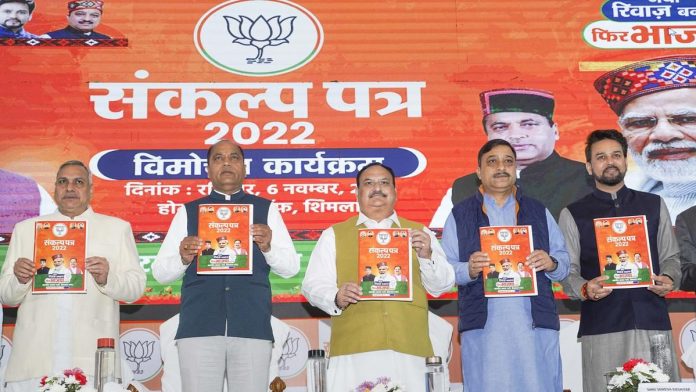While explaining one’s loss after an electoral drubbing is generally not considered graceful conduct on the part of a political party, the reason BJP leaders gave after the INC defeated it in Himachal Pradesh has turned out to be plausible. The loss for the BJP can be attributed to rebellion in the party ranks indeed. BJP rebels contested in at least 21 of the 68 constituencies. Only two of them won, but others got significant votes that may ideally have gone to the BJP.
Observers are talking of a three-way factionalism that was at play: Anurag Thakur and JP Nadda leading a faction each, and the third one was loyal to Chief Minister Jairam Thakur.
No wonder, Union Minister for Information and Broadcasting Anurag Thakur came under fire on social media from BJP supporters immediately after the BJP’s loss in Himachal Pradesh. They blamed him for the infighting in the party.
Thakur was not as lucky. The INC candidate won from Sujanpur, from where the union minister’s father and former Chief Minister Prem Kumar Dhumal used to contest, with a margin of 399 votes. The BJP did not nominate Dhumal this time though the party as well as he insisted he had retired. Thakur was seen publicly shedding a tear “in praise of the hard work” of his father soon after the announcement.
Rebels galore
In Boranj, BJP lost by a margin of just 60 votes. Hamirpur assembly segment went to an Independent candidate while the INC bagged Barsar and Nadaun. The BJP lost all five assembly seats under Union Minister Anurag Thakur’s Lok Sabha constituency Hamirpur in Himachal Pradesh
Among the factions, however, the Nadda-led grouping saved its turf. In the BJP president’s hometown Bilaspur, party candidates won all three Assembly seats, though by narrow margins.
The rebels caused BJP’s loss directly in six constituencies. While a rebel won one of these, in six others, they managed to draw enough votes to be instrumental in impacting the fate of the BJP here. This implies that the BJP could have won these seats if the votes that the rebel candidates drew away were added to the BJP tally.
In Nalgarh, rebel candidate KL Thakur won, with an almost 45% vote share. He defeated the BJP candidate, Lakhwinder Rana, who stood third in the race for the seat, by over 16,000 votes. The BJP had fielded Rana, an INC turncoat, as he had won this seat on a Congress ticket in 2017.
In Kinnaur, BJP rebel Tejwant Singh spoiled the party’s prospects by bagging 8,500 votes. The winning margin between the INC and BJP candidates was a little less than 7,000 votes. While the BJP candidate secured 13,732 votes, the INC candidate got 20,696.
Incumbent BJP MLA in Indora, Reeta Devi, lost by 2,250 votes to the INC candidate. Rebel BJP leader, Manohar Lal, won 4,442 votes here.
Sitting INC MLA from Kullu, Sunder Singh Thakur, managed to retain his seat by a margin of a little over 4,000 votes. BJP’s rebel candidate Ram Singh, who managed to get 11,937 votes while the BJP candidate Narotam Singh secured 26,183 votes, helped Thakur indirectly in winning with 30,286 votes.
Similarly, in Dharamshala, BJP rebel Vipan Nehria drew 7,416 votes whereas the margin between the winning INC candidate Sudhir Sharma and BJP candidate Rakesh Kumar stood at 3,285 votes. In Barsar, BJP rebel Sanjeev Kumar got 15,252 votes, playing a role in the defeat of BJP candidate Maya Sharma, who lost this seat by a margin of 13,792 votes. INC candidate Inder Dutt Lakhanpal won the seat with 30,293 votes.
Most (in)famous rebel
In the run-up to last month’s Himachal assembly elections, the results of which were declared Thursday, as many as 17 BJP leaders, including sitting MLAs, broke away from the party to contest as independent, mostly after being denied tickets by the BJP.
Kripal Parmar, a former BJP MP, was among many rebels who dragged the party’s tally down in the hill state that has traditionally denied any party a second term. He did not quit the contest even after a reported phone call from Prime Minister Narendra Modi and then lost the election while costing the party many votes.
The prime minister tried to persuade Parmar to withdraw. The rebel’s alleged phone call with the prime minister went viral.
Parmar had been upset with his party since last year when the BJP did not pick him for the Fatehpur by-election. He blamed BJP president JP Nadda, his former classmate in school, for his revolt, accusing him of “insulting me for 15 years”.
The rebel said this to Prime Minister Modi in the purported phone call that was never officially confirmed either by the BJP or the Prime Minister’s Office. The voice said to be Prime Minister Modi’s could be heard saying in the call: “Don’t underestimate the value of this phone call.” Parmar replied: “I don’t. This phone call for me is a message from God.”
Parmar told a television channel later that the said the call was not fake and that the prime minister had indeed called him on 30 October.
The 63-year-old politician, who contested the Fatehpur seat as an independent candidate, finished third with just 2,800 votes.
In seven of the 17 constituencies contested by the rebels — Anni, Sundernagar, Kangra, Nachan, Bilaspur, Banjar and, Mandi — the BJP still managed to secure a majority. In all of these seats, except Kangra which had been held earlier by the INC, the seats were already held by the BJP.




You must log in to post a comment.